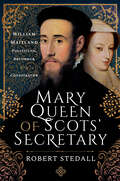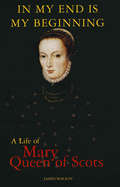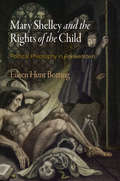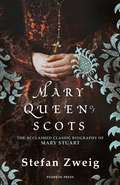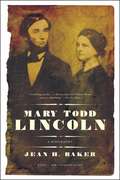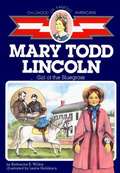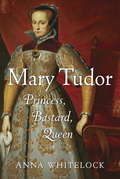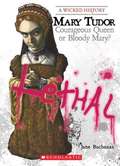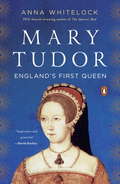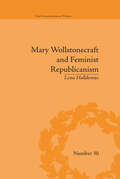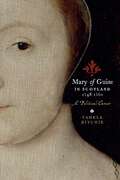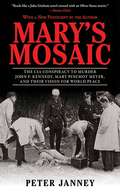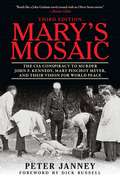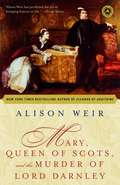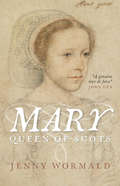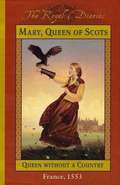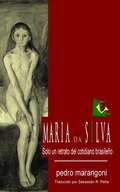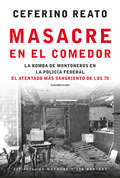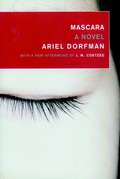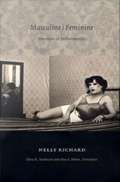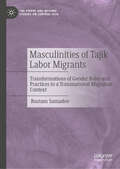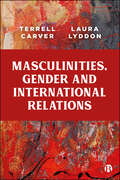- Table View
- List View
Mary Queen of Scots' Secretary: William Maitland—Politician, Reformer and Conspirator
by Robert Stedall“It’s as good as a Philippa Gregory, and tells you so much more about Mary Queen of Scots and the people with whom she surrounded herself.” —Books MonthlyWilliam Maitland of Lethington was the most able politician and diplomat during the lifetime of Mary Queen of Scots. It was he who masterminded the Scottish Reformation by breaking the ‘Auld Alliance’ with France, which presaged Scotland’s lasting union with England.Although he gained English support to defeat French troops defending Mary’s Scottish throne, he backed her return to Scotland, as the widowed Queen of France. His attempts to gain recognition for her as heir to the English crown were thwarted by her determined adherence to Catholicism.After her remarriage, he spearheaded the plotting to bring down her objectionable husband, Lord Darnley, leading to his murder, after concluding that English and Scottish interests were best served by creating a Protestant regency for their son, Prince James. With encouragement from Cecil in England and the Protestant Lords in Scotland, he concocted evidence to implicate her in her husband’s murder, resulting in her imprisonment and deposition from the Scottish throne.This is the thrilling biography of a complicated man whose loyalty wavered between queen and country and whose behind-the-throne machinations may have caused her undoing—and his own . . . “A modern, convincing—I must also use that popular buzzword ‘game-changing’—biography that combines page-turning narrative with convincing, sophisticated, scholarly argument.” —Steven Veerapen, Professor of History, Strathclyde University
Mary Queen of Scots: In My End is My Beginning
by Dr James MackayIn My End Is My Beginning is the story of Mary Queen of Scots (1542–87), the tragic heroine par excellence. Queen of an unfamiliar and troubled nation when she was a week old, it was her misfortune to be a pawn in the game of international politics throughout her life. Even in the brief period from 1561 to 1567 when she was ruler of Scotland in fact as well as in name, she was beset with problems that would have defeated a much stronger, more experienced monarch. A talented poet and a charismatic leader, she contended with a treacherous, self-serving nobility, the religious ferment of the Reformation, and the political ambitions of larger and more powerful neighbours. With little real authority and few resources, Mary’s reign was successful, until her disastrous marriage to the dissolute Darnley set in motion the events that brought about her downfall. For the last 20 years of her life she was a prisoner in the hands of her cousin, Elizabeth I of England, and the subject of treacherous plots and conspiracies. A hostage to fortune, she represented a threat and a rallying-point for English Catholics. Her tragic end was inevitable. Yet her life, with all its adventurous, failures and disasters, produced the son – James – who ultimately brought about the union of Scotland and England.In the End Is My Beginning uncovers the true facts of Mary’s life in the context of Anglo-Scottish relations and shows why, after more than 400 years, she remains arguably the greatest character in popular Scottish history.
Mary Shelley and the Rights of the Child: Political Philosophy in "Frankenstein"
by Eileen Hunt BottingFrom her youth, Mary Shelley immersed herself in the social contract tradition, particularly the educational and political theories of John Locke and Jean-Jacques Rousseau, as well as the radical philosophies of her parents, the feminist Mary Wollstonecraft and the anarchist William Godwin. Against this background, Shelley wrote Frankenstein; or, the Modern Prometheus, first published in 1818. In the two centuries since, her masterpiece has been celebrated as a Gothic classic and its symbolic resonance has driven the global success of its publication, translation, and adaptation in theater, film, art, and literature. However, in Mary Shelley and the Rights of the Child, Eileen Hunt Botting argues that Frankenstein is more than an original and paradigmatic work of science fiction—it is a profound reflection on a radical moral and political question: do children have rights?Botting contends that Frankenstein invites its readers to reason through the ethical consequences of a counterfactual premise: what if a man had used science to create a human life without a woman? Immediately after the Creature's "birth," his scientist-father abandons him and the unjust and tragic consequences that follow form the basis of Frankenstein's plot. Botting finds in the novel's narrative structure a series of interconnected thought experiments that reveal how Shelley viewed Frankenstein's Creature for what he really was—a stateless orphan abandoned by family, abused by society, and ignored by law. The novel, therefore, compels readers to consider whether children have the right to the fundamental means for their development as humans—namely, rights to food, clothing, shelter, care, love, education, and community.In Botting's analysis, Frankenstein emerges as a conceptual resource for exploring the rights of children today, especially those who are disabled, stateless, or genetically modified by medical technologies such as three-parent in vitro fertilization and, perhaps in the near future, gene editing. Mary Shelley and the Rights of the Child concludes that the right to share love and community, especially with parents or fitting substitutes, belongs to all children, regardless of their genesis, membership, or social status.
Mary Stuart
by Eden Paul Cedar Paul Stefan ZweigMary Stuart Queen of Scots, Queen of France and a claimant to the throne of England, was condemned for treason and executed at the age of forty-four. A potential threat to the stability of the English Crown, she was held captive for twenty years by her cousin Elizabeth I, Queen of England. From the moment of her birth until her execution, her life was spent embroiled in the power struggles that shook the foundations of Renaissance Europe.It has taken the free spirit and the immense talent of Stefan Zweig to justly reconstruct events in the life of a woman who was so cruelly united with destiny. With all the rigor of a scientist and the passion of an artist, Zweig has skillfully reconstituted the character of Mary Stuart and the turmoil that was her fate.
Mary Todd Lincoln: A Biography
by Jean M. BakerA privileged daughter of the proud clan that founded Lexington, Kentucky, Mary Todd (1818-1882) was raised in a world of frontier violence. Subjected to her first abandonment at age six when her mother died, Mary later fled a hostile stepmother for Springfield, where she met and, after a stormy romance, married the raw Illinois attorney, Abraham Lincoln. For twenty-five years the Lincolns forged opposing temperaments into a tolerant, loving marriage. Mary was at her husband's side on the night of his assassination, and never recovered from that greatest in a series of grievous abandonments. The desperate measures she took to win the acknowledgment she sought all her life led finally to the shock of a public insanity hearing instigated by her eldest son. In this elegant biography, Jean Baker uses previously untapped letters and documents to portray a woman whose will carried her across the recognized boundaries of female behavior.
Mary Todd Lincoln: Girl of the Bluegrass
by Katharine E. WilkieA biography concentrating on the childhood of the Kentucky girl who grew up to marry Abraham Lincoln.
Mary Tudor
by Anna WhitelockShe was the first woman to inherit the throne of England, a key player in one of Britain's stormiest eras, and a leader whose unwavering faith and swift retribution earned her the nickname "Bloody Mary." Now, in this impassioned and absorbing debut, historian Anna Whitelock offers a modern perspective on Mary Tudor and sets the record straight once and for all on one of history's most compelling and maligned rulers. Though often overshadowed by her long-reigning sister, Elizabeth I, Mary lived a life full of defiance, despair, and triumph. Born the daughter of the notorious King Henry VIII and the Spanish Katherine of Aragon, young Mary was a princess in every sense of the word--schooled in regal customs, educated by the best scholars, coveted by European royalty, and betrothed before she had reached the age of three. Yet in a decade's time, in the wake of King Henry's break with the pope, she was declared a bastard, disinherited, and demoted from "princess" to "lady." Ever her deeply devout mother's daughter, Mary refused to accept her new status or to recognize Henry's new wife, Anne Boleyn, as queen. The fallout with her father and his counselors nearly destroyed the teenage Mary, who faced imprisonment and even death. It would be an outright battle for Mary to work herself back into the king's favor, claim her rightful place in the Tudor line, and ultimately become queen of England, but her coronation would not end her struggles. She flouted the opposition and married Philip of Spain, sought to restore Catholicism to the nation, and fiercely punished the resistance. But beneath her brave and regal exterior was a dependent woman prone to anxiety, whose private traumas of phantom pregnancies, debilitating illnesses, and unrequited love played out in the public glare of the fickle court. Anna Whitelock, an acclaimed young British historian, chronicles this unique woman's life from her beginnings as a heralded princess to her rivalry with her sister to her ascent as ruler. In brilliant detail, Whitelock reveals that Mary Tudor was not the weak-willed failure as so often rendered by traditional narratives but a complex figure of immense courage, determination, and humanity.
Mary Tudor: Courageous Queen or Bloody Mary?
by Jane BuchananBiography of Mary Tudor, Queen of England
Mary Tudor: England's First Queen
by Anna WhitelockAn engrossing, unadulterated biography of "Bloody Mary"--elder daughter of Henry VIII, Catholic zealot, and England's first reigning Queen Mary Tudor was the first woman to inherit the throne of England. Reigning through one of Britain's stormiest eras, she earned the nickname "Bloody Mary" for her violent religious persecutions. She was born a princess, the daughter of Henry VIII and the Spanish Katherine of Aragon. Yet in the wake of Henry's break with Rome, Mary, a devout Catholic, was declared illegitimate and was disinherited. She refused to accept her new status or to recognize Henry's new wife, Anne Boleyn, as queen. She faced imprisonment and even death. Mary successfully fought to reclaim her rightful place in the Tudor line, but her coronation would not end her struggles. She flouted fierce opposition in marrying Philip of Spain, sought to restore England to the Catholic faith, and burned hundreds of dissenters at the stake. But beneath her hard exterior was a woman whose private traumas of phantom pregnancies, debilitating illnesses, and unrequited love played out in the public glare of the fickle court. Though often overshadowed by her long-reigning sister, Elizabeth I, Mary Tudor was a complex figure of immense courage, determination, and humanity--and a political pioneer who proved that a woman could rule with all the power of her male predecessors.
Mary Wollstonecraft and Feminist Republicanism: Independence, Rights and the Experience of Unfreedom (The Enlightenment World #30)
by Lena HalldeniusMary Wollstonecraft is a writer whose work continues to provoke scholarly debate. Halldenius explores Wollstonecraft’s political philosophy, focusing on her treatment of republicanism and independence, to propose a new way of reading her work – that of a ‘feminist republican’.
Mary of Guise in Scotland, 1548–1560: A Political Career
by Pamela E. RitchieChallenging the conventional interpretation of Mary of Guise as the defender of Catholicism whose regime climaxed with the Reformation Rebellion, Pamela Ritchie shows that Mary was, on the contrary, a shrewd and effective politique, whose own dynastic interests and those of her daughter took precedence over her personal and religious convictions. Dynasticism, not Catholicism, was the prime motive force behind her policy. Mary of Guise’s dynasticism, and political career as a whole, were inextricably associated with those of Mary Queen of Scots, whose Scottish sovereignty, Catholic claim to the English throne and betrothal to the Dauphin of France carried with them notions of Franco-British Imperialism. Mary of Guise's policy in Scotland was dictated by European dynastic politics and, specifically, by the Franco-Scottish alliance of 1548–1560. Significantly more than a betrothal contract, the Treaty of Haddington established a ‘protectoral’ relationship between the ‘auld allies’ whereby Henri II was able to assume control over Scottish military affairs, diplomacy and foreign policy as the ‘protector’ of Scotland. Mary of Guise’s assumption of the regency in 1554 completed the process of establishing French power in Scotland, which was later consolidated, albeit briefly, by the marriage of Mary Stewart to Francois Valois in 1558. International considerations undermined her policies and weakened her administration, but only with her death did Mary of Guise’s regime and French power in Scotland truly collapse.
Mary's Mosaic
by Dick Russell Peter JanneyWho really murdered Mary Pinchot Meyer in the fall of 1964? Why was there a mad rush by CIA counterintelligence chief James Angleton to immediately locate and confiscate her diary? What in that diary was so explosive and revealing? Had Mary Meyer finally put together the intricate pieces of a bewildering, conspiratorial mosaic of information that revealed a plan to assassinate her lover, President Kennedy, with the trail ultimately ending at the doorstep of the Central Intelligence Agency? And was it mere coincidence that Mary Meyer was killed less than three weeks after the release of the Warren Commission Report?Based on years of painstaking research and interviews, much of it revealed here for the first time, author Peter Janney traces some of the most important events and influences in the life of Mary Pinchot Meyer--including her first meeting with Jack Kennedy at the Choate School during the winter of 1936, her explorations with psychedelic drugs, and finally how she supported her secret lover, the president of the United States, as he turned away from the Cold War toward the pursuit of world peace. As we approach the fiftieth anniversary of President Kennedy's assassination--and Mary Meyer's--Mary's Mosaic adds to our understanding of why both took place.This paperback edition has been updated and revised with a significant postscript that focuses on Meyer's alleged assassin, who the author finally located and confronted in person in August 2012, as well as the ongoing saga of Janney's attempt to reopen the case based on new evidence.
Mary's Mosaic: The CIA Conspiracy to Murder John F. Kennedy, Mary Pinchot Meyer, and Their Vision for World Peace: Third Edition
by Dick Russell Peter JanneyExplores the murder of Mary Pinchot Meyer and her connected to President KennedyIdeal book for fans of The Devil’s Chessboard by David Talbot, The Reporter Who Knew Too Much by Dorothy Kilgallen, Dr. Mary’s Monkey by Edward T. Haslam, and other JFK conspiracy booksUpdated edition of the true crime expose, including new evidence and government documents corroborating the conspiracy to assassinate JFK’s trusted ally and final true loveThe death of Mary Meyer left many Americans with questions. Who really killed her? Why did CIA counterintelligence chief James Angleton rush to find and confiscate her diary? Had she discovered the plan to assassinate her lover, President Kennedy, with the trail of information ending at the steps of the CIA? Was it only coincidence that she was killed less than three weeks after the release of the Warren Commission Report?Fans of The Murder of Mary Russell, JFK: A Vision for America, and other JFK books will love Mary’s Mosaic. Building and relying on years of interviews and painstaking research, author Peter Janney follows the key events and influences in Mary Pinchot Meyer’s life—her first meeting with Jack Kennedy; her support of her secret lover, President Kennedy, as he worked towards the pursuit of world peace and away from the Cold War; and her exploration of psychedelic drugs. Fifty years after the assassinations of President Kennedy and Mary Meyer, this book helps readers understand why both took place. Author Peter Janney fought for two years to obtain documents from the National Personnel Records Center and the US Army to complete this third edition. It includes a final chapter about the mystery man who could be the missing piece to learn the truth behind Meyer’s murder.
Mary, Queen of Scots, and the Murder of Lord Darnley: And The Murder Of Lord Darnley
by Alison WeirHandsome, accomplished, and charming, Henry Stuart, Lord Darnley, staked his claim to the English throne by marrying Mary Stuart, who herself claimed to be the Queen of England. It was not long before Mary discovered that her new husband was interested only in securing sovereign power for himself. Then, on February 10, 1567, an explosion at his lodgings left Darnley dead; the intrigue thickened after it was discovered that he had apparently been suffocated before the blast. After an exhaustive reevaluation of the source material, Alison Weir has come up with a solution to this enduring mystery. Employing her gift for vivid characterization and gripping storytelling, Weir has written one of her most engaging excursions yet into Britain's bloodstained, power-obsessed past.From the Trade Paperback edition.
Mary, Queen of Scots: Now A Major New Film (The Stewart Dynasty in Scotland #8)
by Jenny WormaldThe acclaimed Scottish historian offers a provocative reassessment of one of British royalty&’s most famous figures in this authoritative biography. Mary Stuart, Queen of Scots, has long been portrayed as one of history&’s romantically tragic figures. Devious, naive, beautiful and sexually voracious, often highly principled, she secured the Scottish throne and bolstered the position of the Catholic Church in Scotland. Her plotting, including probable involvement in the murder of her husband Lord Darnley, led to her flight from Scotland and imprisonment by her equally ambitious cousin and fellow queen, Elizabeth of England. Yet when Elizabeth ordered Mary&’s execution in 1587 it was an act of exasperated frustration rather than political wrath. Unlike previous biographies of Mary, this masterly study eschews her romantic persona in order to shine a light on her role as a renaissance monarch. A leading historian of the period, Jenny Wormald traces the roots of Mary&’s downfall to her way of dealing, or failing to deal, with the problems facing her as a ruler. She was tragic because she was born to supreme power yet wholly incapable of coping with its responsibilities.
Mary, Queen of Scots: Pride, Passion and a Kingdom Lost
by Jenny WormaldMary Stuart, Queen of Scots, was one of history's romantically tragic figures. Devious, naive, often principled, beautiful and sexually voracious, this was a woman who had secured the Scottish throne and bolstered the position of the Catholic Church in Scotland. Her endless plotting, including a probable involvement in the murder of her husband Lord Darnley, eventually led to her flight from Scotland and imprisonment by her equally ambitious cousin and fellow queen, Elizabeth I of England. And yet when Elizabeth ordered her unpredictable rival and kinswoman to be beheaded in 1587, she did so in resigned frustration rather than as an act of political wrath. Was the beheading of a cousin truly necessary? Did Mary, though churlish, petulant and often disloyal, deserve to forfeit the compassion of her cousin, a woman who had since childhood been her friend and playmate? Mary's fragile fate was to be born to supreme power whilst totally lacking in the political ability to deal with its responsibilities. Her story, which has inspired poets, playwrights and operatic composers of the centuries, is one of the most colourful and emotional tales of Western history, and is here told by a specialist of the 16th century.
Mary, Queen of Scots: Queen Without a Country (The Royal Diaries)
by Kathryn LaskyOnly nine months old when she's crowned Queen of Scots, Mary is sent to live in France until she is old enough for marriage and the throne. While there, Mary excels at dance, music, poetry, and horsemanship.
María Estuardo, reina de Escocia: Edición estudiante – maestro (Mujeres legendarias de la Historia Mundial #3)
by Laurel A. RockefellerLa reina María Estuardo fue una de las más amadas y controversiales mujeres en la historia de Escocia. Nieta del rey James IV y su esposa Margaret Tudor, con un estatus de heredera aparente al trono inglés junto con la violencia de la Reforma Protestante Escocesa dio lugar a una de las vidas más dramáticas y poco entendidas del siglo XVI. Este libro cuenta la historia verdadera de María, enfocándose principalmente en su reinado como reina de Escocia, celebrando su vida más que su muerte y mostrándonos a todos nosotros porque era una mujer adelantada a su tiempo. La edición estudiante - maestro incluye preguntas de estudio después de cada capítulo, además de una cronología detallada y una extensa lista de lecturas sugeridas.
María da Silva, solo un retrato del cotidiano brasileño
by Pedro Marangoni Sebastián Rodolfo PeñaPresentación No se puede afirmar que “María da Silva” sea un trabajo de ficción puesto que es un retrato del cotidiano sin retoques. Un pequeño libro sobre la corta vida de una buscadora de basura en Brasil. No hay descripciones superfluas, de ese modo el lector compondrá el ambiente leyendo el drama com el escenario que conoce, que sucede cerca suyo, que ve en su día a día y cuya rigidez desconoce. Diariamente “Marías da Silva” mueren de inanición y de enfermedades no tratadas, en una breve tragedia pasada en la vida, llevándose consigo toda una historia ignorada por los demás ciudadanos. Ya es hora de verlas como seres humanos y este pequeño libro puede ayudar. Siento que la obra no es mía, solamente soy el presentador del mensaje de María da Silva. Creo que si algunos lectores después de conocerla cambien, aunque sea la mirada frente a los buscadores de basura – que buscan lo despreciado, no piden limosna - la misión que me confiaron por casualidad habrá sido cumplida.
Masacre en el comedor: La bomba de Montoneros en la Policía Federal. El atentado más sangriento de los 70
by Ceferino ReatoLa primera historia documentada sobre el mayor atentado contra una dependencia policial en el mundo: la voladura del comedor de la Superintendencia de Seguridad de la Policía Federal en plena dictadura y el papel de Pepe Salgado, autor material del atentado, y Rodolfo Walsh, hombre clave de la Inteligencia montonera. La bomba de Montoneros que explotó en el comedor de la Superintendencia de Seguridad Federal el 2 de julio de 1976, a cien días de instalada la dictadura militar, dejó veintitrés muertos y ciento diez heridos. Fue el atentado terrorista más sangriento de la historia argentina hasta la voladura de la AMIA y sigue siendo el mayor contra una dependencia policial en todo el mundo. Sin embargo, no ha despertado el interés de periodistas ni de historiadores; tampoco el de la Justicia, que cuarenta y cinco años después sigue sin haberlo investigado. Obra cumbre de la guerrilla, parece tratarse de una realidad incómoda para todos: contemporáneamente comportó una humillación poco digerible para la Policía y el gobierno de Videla; en perspectiva, constituye un hecho difícil de justificar para el relato hegemónico sobre los 70. Más aún a la hora de hacer nombres: si bien la bomba es colocada por un joven de clase media alta infiltrado en la institución, José María Salgado, el atentado lleva la firma del servicio de Inteligencia e Informaciones de Montoneros, cuyo hombre clave era Rodolfo Walsh. Este libro parte de la explosión y reconstruye el minuto a minuto de aquellos días, acudiendo a sus fuentes y protagonistas, desde deudos de las víctimas hasta familiares de Pepe Salgado. En ese gesto repone un capítulo interesadamente olvidado de nuestro pasado y tácitamente postula su argumento: la verdadera historia de los 70 es la historia de todas sus víctimas.
Mascara: A Novel
by Ariel DorfmanMascara delves into the dark terrain of identity and disguise when the lives of three people collide. A nameless man with a face no one remembers has the devastating ability to see and capture on film the brutal truths lurking inside each person he encounters. Oriana, a beautiful woman with the memory of an innocent child, is relentlessly pursued by mysterious figures from her past. Doctor Mavirelli is a brilliant and power-hungry plastic surgeon who controls society's most prominent figures by shaping their faces. The twining of these three fates plays out in a climactic unmasking.
Masculine/Feminine: Practices of Difference(s)
by Nelly RichardNelly Richard is one of the most prominent cultural theorists writing in Latin America today. As a participant in Chile's neo-avantgarde, Richard worked to expand the possibilities for cultural debate within the constraints imposed by the Pinochet dictatorship (1973-1990), and she has continued to offer incisive commentary about the country's transition to democracy. Well known as the founder and director of the influential Santiago-based journal Revista de crítica cultural, Richard has been central to the dissemination throughout Latin America of work by key contemporary thinkers, including Néstor García Canclini, Jacques Derrida, Fredric Jameson, and Diamela Eltit. Her own writing provides rigorous considerations of Latin American identity, postmodernism, gender, neoliberalism, and strategies of political and cultural resistance. Richard helped to organize the 1987 International Conference on Latin American Women's Literature in Santiago, one of the most significant literary events to take place under the Pinochet dictatorship. Published in Chile in 1993, Masculine/Feminine develops some of the key issues brought to the fore during that landmark meeting. Richard theorizes why the feminist movement has been crucial not only to the liberation of women but also to understanding the ways in which power operated under the military regime in Chile. In one of her most widely praised essays, she explores the figure of the transvestite, artistic imagery of which exploded during the Chilean dictatorship. She examines the politics and the aesthetics of this phenomenon, particularly against the background of prostitution and shantytown poverty, and she argues that gay culture works to break down the social demarcations and rigid structures of city life. Masculine/Feminine makes available, for the first time in English, one of Latin America's most significant works of feminist theory.
Masculinities of Tajik Labor Migrants: Transformations of Gender Roles and Practices in a Transnational Migration Context (The Steppe and Beyond: Studies on Central Asia)
by Rustam SamadovThis book explores masculinities of Tajik men and offers insights on how migrant and non-migrant men maintain their gender identity and adjust their gender practices in the context of transnational labor migration from Tajikistan to Russia. Being in the state of transnational in-betweenness, Tajik non/migrant men and often their spouses need to adapt to gender norms of both Russian and Tajik gender orders despite the orders' very different and at times contradicting gender requirements. Therefore, the book provides the first comprehensive analysis of Tajik non/migrant men's masculinities and their navigation between various forms of masculinity: hegemonic, complicit, marginalized, protest and dominant, thereby performing flexible and strategic masculinity. While focusing on migrant men, this research also highlights the role of women in sustaining their partners' masculine image and the ways how Russian women adjust their gender practices in response to the requirements of Tajik society.
Masculinities, Gender and International Relations
by Terrell Carver Laura LyddonGender is widely recognized as an important and useful lens for the study of International Relations. However, there are few books that specifically investigate masculinity/ies in relation to world politics. Taking a feminist-inspired understanding of gender as its starting point, the book: • explains that gender is both an asymmetrical binary and a hierarchy; • shows how masculinization works via ‘nested hierarchies’ of domination and subordination; • explores the imbrication of masculinities with the nation-state and great-power politics; • develops an understanding of the arms trade with commercial processes of militarization. Written in an accessible style, with suggestions for further reading, this book is an invaluable resource for students and teachers applying ‘the gender lens’ to global politics.
